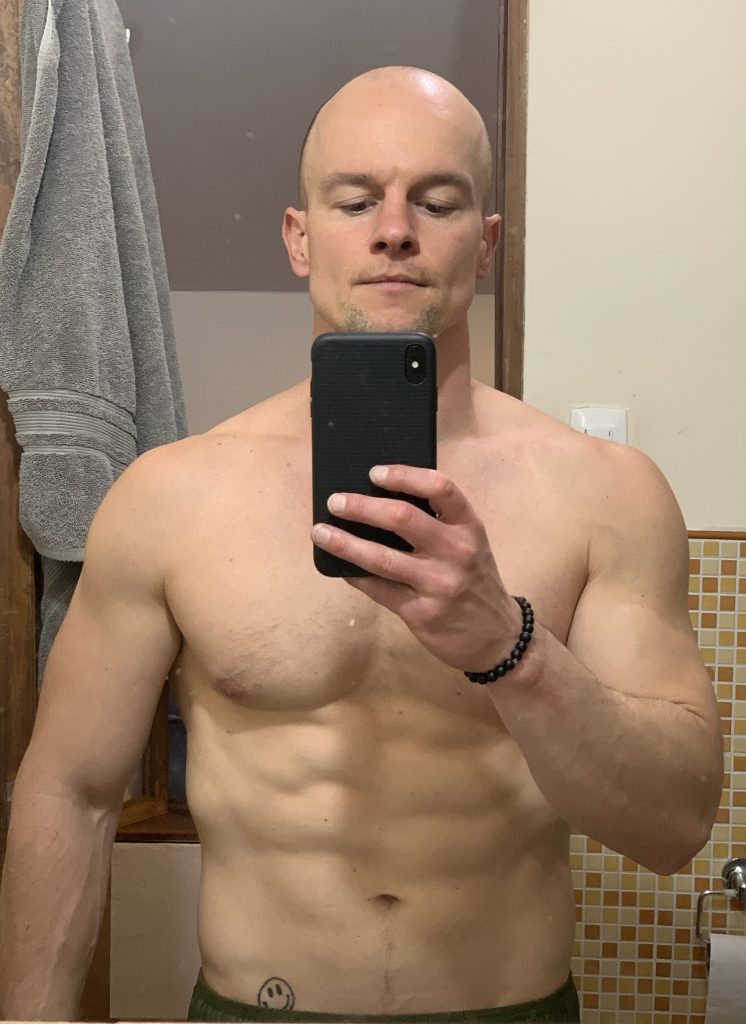
For the last half a year, I’ve been eating once a day, at night.
During the day I’ll have water, coffee, and 1-2 pieces of fresh fruit before my workouts. That’s it.
I eat all my food in the evening after the day’s work is done.
I wouldn’t call it “one meal a day” or “OMAD”, because it’s not really one meal.
Sometimes, I finish my dinner within an hour, but on most days, you’ll see me eat right up until I hit the sheets. So we’re talking about a 2-4 hour timeframe, late in the day.
Now, here’s the interesting part. Since I started doing this, the amount of food I consume (total calories) has gone up, while my level of bodyfat has gone down. (Watch any of my recent YT videos or IG posts and see for yourself)
I’m eating considerably more these days and I’ve never looked and felt better. But more than anything, I’ve never been able to maintain such a high rate of output without hitting a wall.
How? In short, superior metabolic function.
Will eating just once a day do the same for you? Maybe. Probably not.
The other day, my girl was telling me how eating smaller, more frequent meals on a recent trip had her losing weight without trying.
So what’s the deal here? Is eating 3 square meals a day better than intermittent fasting for weight loss? What about 5-6 meals? That’s what athletes do, right?
Why You Shouldn’t Eat Like Uncle Vic
I don’t recommend people do what I do.
I don’t recommend you eat like I do.
Though in my mind, this is unquestionably the best way of fueling the human body, not many of you will be able to handle it.
And I’m not even talking about the hunger you’ll experience throughout the day. You’ll get used to that rather quickly.
No. I’m talking about the inability to eat enough food at night. Most of you do not have the stomach capacity to eat enough in one sitting and thus fail to compensate for your daily efforts.
And after the initial rush of this new routine wears off, you’ll be left feeling weak, cold, and generally miserable.
I know. I’ve been there.
The problem is not the late-night eating (Never was, despite a lot of short-sighted research claiming just that.).
The problem is you’re not eating enough. You’re starving yourself and, unsurprisingly, your body is not too excited about it.
But make no mistake. If you do it right – the way I do it – you’ll soon realize this is a far superior way of eating (living, really). After seeing the results in myself and multiple clients, there’s no question in my mind.
We’re talking about a quantum leap in performance (physical and cognitive), body composition, and general well-being.
However, for most of you reading this, I do not advocate long daily fasts with a tight eating window. Not initially, that is.
How To Use Intermittent Fasting For Superior Results
What about the metabolism, you ask?
Isn’t eating multiple meals throughout the day better for your metabolism than having 1-2 large meals? And isn’t going long stretches without food going to slow your metabolism down?
Not at all. In fact, I would argue it’s the other way around.
Eating small meals every couple of hours will curb your metabolism, not boost it.
And it’s clear as day. Why would your body expend large amounts of energy if you’re only feeding it bird-shit sized meals?
High-calorie intake drives metabolism, not high meal frequency.
And individual meal size plays a major role here. The larger your meals the bigger the post-meal bump in calorie expenditure.
[That’s why you break out in a sweat after Thanksgiving dinner. Every day is Thanksgiving dinner for me.]
So why did my beautiful beautiful girl lose weight initially eating more frequent meals?
Because she’s been fasting intermittently for months and her body had adapted to large spikes in calories at mealtimes. So when she started eating smaller (regular) meals, her metabolism was burning through them like your diabetic uncle burns through chocolate mousse cake.
And that doesn’t even factor in the drop in overall calorie intake. The result is spontaneous weight loss.
But don’t get it twisted. The body will adapt to those small meals very quickly and downregulate the metabolism accordingly.
And then you’re stuck eating less and gaining fat just by looking at pizza.
The objective must be to optimize metabolic function through daily periods of fasting and compensatory high-calorie meals.
Don’t get ahead of yourself. Ease into it.
You will experience tremendous benefits just by skipping breakfast and eating your first meal at lunchtime. Not hungry yet? Push the meal back to the afternoon hours.
Don’t fear hunger, make friends with it.
I believe it is highly beneficial and very necessary to experience a controlled hunger sensation during the day. It will make you sharper, clearer, and… more alive.
Have your first meal anywhere between 4-8 hours after waking and eat your main (biggest) meal at dinnertime.
Alternatively, stick to a couple pieces of fruit during the day, and have your only meal at night (aka “The Victorious Protocol”).
In any case, do not hold back when you sit down to eat. Eat reasonably, but eat to satisfaction.
The amount will differ greatly between individuals. If you carry some muscle and are reasonably active, you will have to eat fairly large meals.
Let me reiterate. The reason this meal strategy won’t work for a lot (most) of you is because you will fail to eat enough to compensate for your daily efforts.
Let’s face it. A lifetime of dreadful eating habits and failed diet attempts have destroyed your relationship to food. You’re afraid of food, let alone eating to fullness and complete satisfaction.
But I’m telling you right now if you refuel adequately at your mealtimes, this is the ultimate human performance diet. Nothing compares.
Let your body adapt. Allow it to go through cycles of deprivation and compensation, ideally, on a daily basis. Don’t eat, then eat big.
But don’t take my word or my anecdotal results for it. Give it an honest shot. Once you experience the benefits firsthand, you’ll know what’s up and you’ll never wanna go back.
See you at dinner
V

Leave a Reply